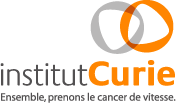Channels
Special Offers & Promotions
Curie-Cancer and Roche strengthen partnership to fast-track the development of new molecules
Curie-Cancer and Roche build on four years partnership by increasing translational research programs, speeding up development of new cancer treatments
 Curie-Cancer, the body responsible for developing Institut Curie’s industry partnership activities, and the Roche Institute for Research and Translational Medicine are strengthening their collaborative efforts.
Curie-Cancer, the body responsible for developing Institut Curie’s industry partnership activities, and the Roche Institute for Research and Translational Medicine are strengthening their collaborative efforts.
In 2009, the Institut Curie and Roche signed an initial three-year agreement to partner one another in a major pre-clinical research program. The aim of the partnership was the better understanding of the mechanism of action of a new Roche antibody to target under-served highly aggressive forms of breast cancer. This antibody was the first in a new therapeutic class.
The partnership gave Roche access to a platform of pre-clinical models, developed by the research teams at the Institut Curie. These models are highly representative of the tumors observed in patients. Using this platform, Roche was able to determine in which sub-type of breast cancer the antibody was most effective. The Institut Curie also owns the RPPA platform (Reverse Phase Protein Analysis), globally one of the most sophisticated tools of its kind due to the number of cell activity markers it allows users to investigate. Using this platform, researchers were able to gain a more detailed understanding of the impact of the Roche antibody on the cancer cells at the molecular level, also to identify predictive response markers.
By combining the expertise of the teams at Curie-Cancer and Roche during the pre-clinical development phase for the molecule, it was possible to develop a better-defined protocol for the first clinical trials. This was a key factor in maximizing the success of these trials.
"This first partnership between the research teams at the Institut Curie and Roche has been an extremely positive experience," said Celine Bouquet, director of the Roche Institute for Research and Translational Medicine. "The close relationship between the clinical and research teams meant that it was a natural choice for Roche to select the Institut Curie as the center for phase I of its clinical development work [administration of the drug to the first human patients]. The first patient in the world to trial this new treatment was an Institut Curie patient."
Curie-Cancer and Roche are currently working on several translational research programs involving Roche molecules that make use of the same technology. As one example, a team of Curie-Cancer clinicians, anatomopathologists and researchers are working on developing a new Roche molecule targeting the tumor environment. This is an example of how the Institut Curie successfully spans the complete development process from pure research to translational research to clinical research. In doing so it encompasses the vision of its founder Marie Curie.
"It is vital that pharmaceutical laboratories consult with us about their needs and questions early in the molecule development process. This allows us to propose partnership options that offer a wealth of expertise and a wide range of technological platforms. Scientific discussions of this kind also allow us to identify new, innovative approaches, some of which are based on pure research findings," said Sergio Roman-Roman, director of translational research at the Institut Curie.
Prominent academic research institutes such as the Institut Curie have developed a number of technological platforms to assist their own research work. They are a real asset for research programs conducted hand in hand with industry partners. These platforms require significant investment, some of which is provided by governments.
"This partnership with Roche has shown, once again, that research conducted by the Institut Curie perfectly meets the requirements of our industry partners," said Damien Salauze, director of Curie-Cancer. "In 2011, Curie-Cancer was awarded the Carnot label in recognition of the quality of its research. We seek to make this knowledge available to partners of all sizes, whether they are small or medium-sized enterprises or international groups, with the ultimate aim of benefiting patients."
Pure research is a source of knowledge, while clinical research is the motor of medical progress. Translational research forms the link between the two. It provides a solution to speed up the development of new treatment options through an improved understanding of cancer biology. In particular, translational research enables scientists to define predictive markers in order to assess the effectiveness of new molecules and better identify the patient sub-groups that are most likely to benefit from them.
"Translational research brings all the different players together, for the benefit of everyone. We want to promote this way of working, so that patients have access to new treatment options sooner," said Corinne Le Goff, president of Roche Pharma France and of the Roche Institute for Research and Translational Medicine. "Following the success of this first partnership, we are keen to work with Curie-Cancer as a preferred partner on our upcoming pre-clinical studies involving Roche molecules."
Media Partners


